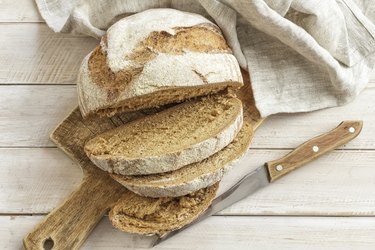
Gout is a form of arthritis that can cause debilitating joint pain. If you have this painful condition, you may have been given a list of foods to avoid with gout. While diet changes may help reduce gout attacks, the arthritis is primarily controlled with medical intervention.
Tip
Yes, you can eat bread if you have gout. However, if you have frequent gout attacks, limiting your intake of whole-wheat bread may be advised, but isn't usually necessary.
Video of the Day
Gout and Diet Connection
The intense pain and swelling you experience during a gout attack occurs when urate crystals accumulate in your joint, according to the Mayo Clinic. These crystals develop due to an excess of uric acid in your blood, which comes from the breakdown of purines — a substance naturally found in your body.
Video of the Day
Uric acid is normally removed from your blood by your kidneys. However, if your body produces too much uric acid or your kidneys can't clear it from your blood fast enough, the uric acid turns into the needle-like crystals that lead to the tell-tale pain and swelling of gout. These crystals can accumulate in any joint in your body, but if you have gout attacks you know that the joint in your big toe is most vulnerable.
In addition to being found naturally in your body, purines are also present in food, including bread. Foods high in purines include beef, seafood, and organ meats. Bread has a low-to-moderate amount of purines, according to the UK Gout Society.
A low-purine diet was once recommended as a treatment for gout. However, according to the Arthritis Foundation, the gout diet is too restrictive and not nearly as effective as the medication used to control the arthritis.
Foods to Avoid With Gout
If you have gout, both the UK Gout Society and the Arthritis Foundation suggest you avoid all high-purine foods. Eating a diet filled with high-purine foods may increase your risk of a gout attack by five times, according to the UK Gout Society.
The list of foods to avoid with gout is:
- Liver
- Kidneys
- Heart
- Pheasant
- Rabbit
- Venison
- Oily fish (anchovies, herring, sardines)
- Commercial gravies
Alcoholic beverages, including beer, are also high in purines.
The Arthritis Foundation also suggests you limit your intake of foods with moderate amounts of purines to help control gout attacks. Moderate-purine foods include:
- Beef
- Chicken
- Duck
- Pork
- Shellfish (mussels, crabs, shrimp)
The UK Gout Society also includes legumes (beans, peas), mushrooms and whole grains, including whole-wheat bread, on the moderate-purine food list. If you're struggling with regular gout attacks, whole-wheat bread may not make the best bread for gout control.
If you're not experiencing any gout attacks, the Arthritis Foundation suggests you slowly add some of the moderate-purine foods back into your diet and monitor your symptoms.
Foods to Eat With Gout
After reviewing the list of foods to avoid with gout, you may wonder what's left to eat. Both the Mayo Clinic and the UK Gout Society suggest you follow a healthy, balanced diet that helps you control your weight. According to Mayo Clinic, reducing your overall calorie intake and losing weight can improve your uric acid levels and reduce your risk of having a gout attack, even if you're not limiting your intake of high-purine foods.
Foods to eat with gout include:
- Fruits and vegetables
- Whole grains
- Healthy proteins (poultry, lean red meat, seafood, lentils)
- Moderate amounts of dairy
The best bread for gout may depend on your personal health needs and uric acid levels. While whole-wheat bread contains more purines than white bread, if you're following a reduced calorie diet for weight loss, whole-wheat bread may be the best bread for gout because it has a higher nutritional value than white bread.
There's been some evidence that vitamin C may help lower uric acid levels. However, research has been mixed, as noted by a June 2013 randomized, clinical controlled trial published in Arthritis & Rheumatism. While previous studies found that supplementing with 500 milligrams of vitamin C improves uric acid levels, this study did not have the same results. This study only included 40 participants and larger clinical trials are needed before conclusions can be drawn.
While it's not certain how vitamin C can help your gout, you can talk to your doctor about adding vitamin C supplements to your regimen, or include more vitamin C rich foods in your diet, such as oranges, tomatoes, broccoli and peppers.
- Mayo Clinic: "Gout"
- UK Gout Society: "All About Gout and Diet"
- Arthritis Foundation: "Safe Foods for Gout"
- Mayo Clinic: "Gout Diet: What's Allowed, What's Not"
- Arthritis & Rheumatism: "Clinically Insignificant Effect of Supplemental Vitamin C on Serum Urate in Patients With Gout: A Pilot Randomized Controlled Trial"
- Office of Dietary Supplements: "Vitamin C"